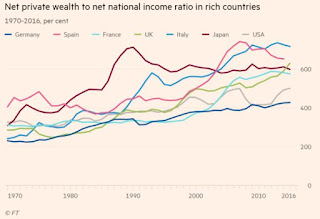Up to this point there have been many who argued on both sides of this debate. Interestingly, there are now indicators that point to culture and geography as primary determinants of which side of the wealth tax "fence" someone places himself or herself. Here are the basic arguments:
In Favor of Net Wealth Tax
- World Inequality Report projects that if current trends continue, the top 0.1% will own more of the world's wealth than the entire global middle class by 2050.
- Most wealthy nations have up to six or seven times the annual national income held in private wealth. Figure 1.1 credit to FT:
- The tax burden is shifted away from productive investors and toward unproductive investors who sit on their fortunes. Thus, gross capital is increased in productivity by incentivising higher returns for the investing class, and taxing overall lower return capital
Against the Net Wealth Tax
- The World Inequality Report's projections are unreliable because their own report cites deficiencies in available wealth data.
- As Karl Marx would have wished, a net wealth tax ultimately subsidizes economic lethargy by punishing those who carry the largest cost and liability burdens.
- Wealth tax codes are tethered to fixed locations on a map. By hiking a wealth tax in one place, it only incentivizes the wealthy to evacuate and take their capital elsewhere. In essence, it creates a massive capital vacuum, and an exodus of economic potential.
- Most reports that focus on inequality between wealth classes almost always neglect to report the corresponding levels of economic mobility. So while in the United States wealth inequality has been increasing over the past decade, so too has the potential for "lower" classes to travel up the ladder into higher circles of wealth.
- Governments are replete with historical evidence of their ineptitude for smart spending. On the other hand, there's nothing to say that if governments indeed taxed their fill of the wealthy class that their budgetary departments wouldn't just blow it anyway.
Regulators need to be thinking about these issues going into 2019. What is economic fairness? Who is better-suited to mobilize capital efficiently? Readers, what do you think?

No comments:
Post a Comment